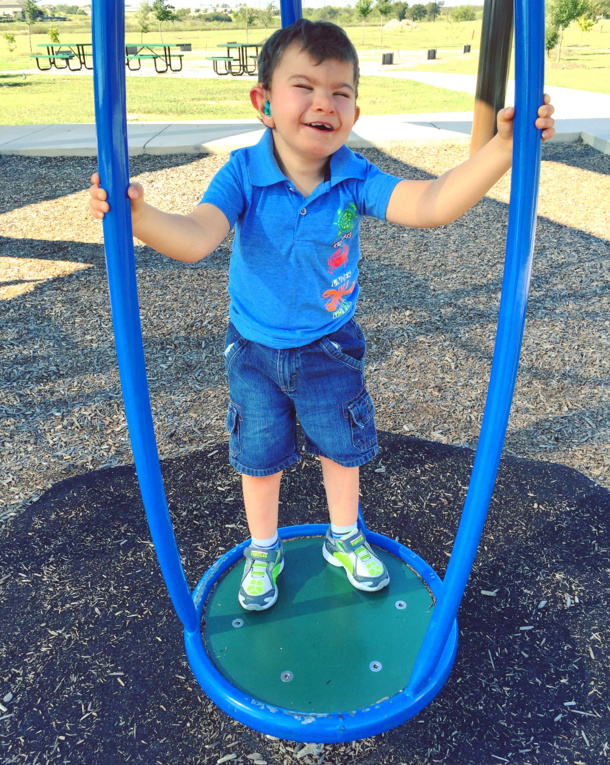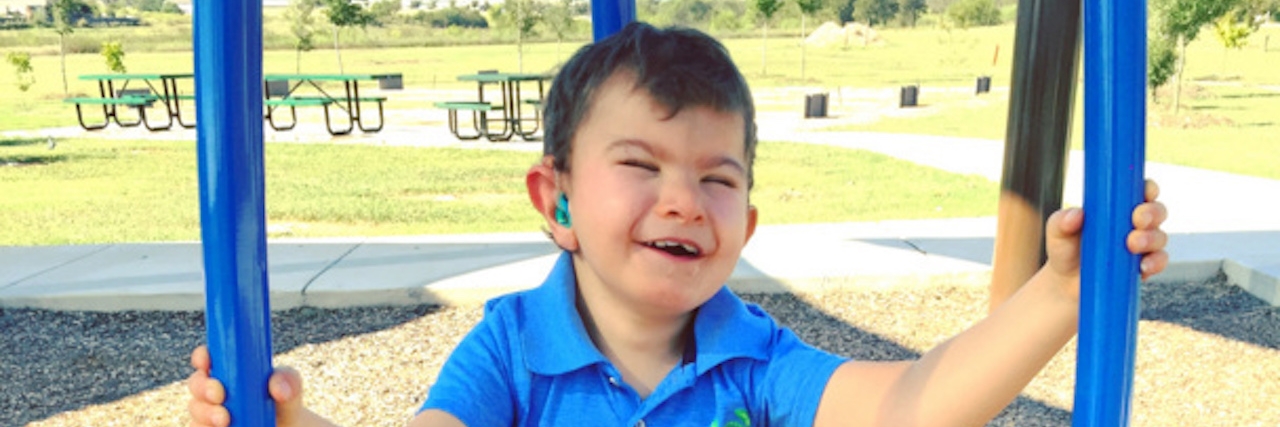To the People Who Think I’m ‘Jumping on the Bandwagon’ on Rare Disease Day
Through the years, I have become extremely passionate about raising awareness of things I never knew existed until I was affected. Also through the years, I have been criticized for “jumping on the bandwagon” to simply share a photo, a ribbon or a video. But it’s about so much more than that. Awareness is simply the first step to so much more. Today I share with you the criticisms and why awareness is so needed.

My child is more than a diagnosis.
While I do tend to agree with this sentiment, I also struggle because I know my child, Braxton, wouldn’t be who he is without the diagnosis. The very things I love the most about him are tied into the diagnosis. Braxton’s heart-melting smile is actually an almost universal characteristic of all children with Rubinstein Taybi syndrome (RTS). I love how he gets excited and his arms and body tense up as he moves his arms up and down or in and out. I love his big eyes and to-die-for long eyelashes. I love how he has taught me to slow down and see the beauty in the unspoken, not to take life for granted and how to love unconditionally. He may not have had these characteristics were it not for RTS.
Just because I bring attention to his diagnosis does not mean I am demeaning who he is as a person. I want you to see Braxton for Braxton. I want you to see he is a mischief-makin’, rough-and-tumble 4-year-old little boy. But I also want you to know what RTS can look like because one day you might run into a family who lives in doctor’s offices trying to understand what is going on with their child, but no one knows. It took us two long years to find a diagnosis, but we know people who were diagnosed within hours, days, weeks of birth. If RTS were more known, we would have had an answer right away instead of the loud voice of the neonatologist saying our son wouldn’t live more than a few weeks. That in itself is reason enough for awareness.
RTS isn’t a disease.
Technically, it is. Disease is defined as “a disorder of structure or function in a human, animal, or plant, especially one that produces specific signs or symptoms or that affects a specific location and is not simply a direct result of physical injury.” RTS can be the result of mutations in the CREBBP or EP300 genes, which are responsible for making proteins that help control the activity of many other genes. (This is extremely simplified.) Therefore, a mutation in one of these genes is a disorder of structure and function.
Unfortunately, the issue is not with the definition of disease, but in the connotation, the meaning implied or associated with the word disease. When most people hear the word “disease,” they think of someone who is sick, dying and searching for a cure. If you use the implied definition of disease, then, no, RTS is not a disease. It is a condition or disorder — but guess what, those words are actually synonyms for disease.
You’re just looking for pity.
No, actually, we’re not. I don’t want you to feel sorry for me, my son or our family. But I do want you to support the cause. We have met professional after professional whose immediate response after I tell them Braxton has Rubinstein Taybi syndrome is “Oh, I’ve never heard of that,” and these are medical professionals — doctors, nurses, anesthesiologists, x-ray technicians. The very people we depend on when Braxton is sick or needs surgery have never heard of his condition.
We want the medical community to know who we are and how to meet our needs. I need someone who understands the risks anesthesia brings to Braxton specifically due to his RTS diagnosis. Someone who understands how to read his x-ray while taking in to account underlying bone issues due to his RTS diagnosis. Someone who doesn’t mistake his silence as rudeness. Awareness is extremely important in receiving proper medical care, services and insurance coverage.
Your time could be better spent.
Yes, I have actually been told I am wasting my time raising awareness, sharing a ribbon and creating a video. That I should be thinking of ways to actually help people, to understand why our children are affected the way they are, to see what needs are not being met through currently available services. Yes, these are all very worthy and need our attention as well, but that costs money. To fund research, to poll focus groups, to help introduce new disability legislation — that all requires financial backing. And do you know how hard it is to fund something people have never heard of? I do.
In the work I’ve done with the nonprofit, U.R. Our Hope, which helps families of children with undiagnosed and rare diseases, I have seen firsthand how difficult it is to garner support for an issue that is widely unknown. But in the last three years, our events have grown, and our reach is spreading. The more awareness we’ve raised, the more money has also come with that awareness. Money that can be used to help families or fund research or fund the creation of an undiagnosed national database to help patients get a diagnosis faster. Awareness is just the first step in making a difference.
Awareness without action is pointless.
This I do agree with, which is why awareness, for me, isn’t limited to any one specific day. I always try to encourage action. Action can be as simple as taking a few minutes to research a new diagnosis or as elaborate as hosting a fundraising event to address a specific need for a rare disease community. Sharing a ribbon or changing your profile picture is not enough. You need to get out and do something. Teach someone about what you have learned. Raise or donate money to a specific cause. Meet someone with a rare disease and learn about what they like and don’t like. Learn who they are as a person. Play a game with them. You will surely find more common ground than you think.
Meet some of our RTS brothers and sisters in our Facebook album.
Learn more about Rubinstein-Taybi syndrome at www.rubinstein-taybi.org.
Donate to the Special Friends Foundation, which is dedicated to helping individuals with RTS.
Follow this journey on Journey Full of Life.
The Mighty is asking the following: What’s one thing people might not know about your experience with disability, disease or mental illness, and what would you say to teach them? If you’d like to participate, please send a blog post to community@themighty.com. Please include a photo for the piece, a photo of yourself and 1-2 sentence bio. Check out our Submit a Story page for more about our submission guidelines.

